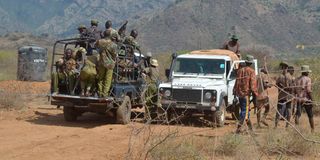Police ban fishing without security in Todonyang to stop Lake Turkana militia attacks

Security personnel on patrol in Turkana. Police in Turkana County have banned unguarded fishing activities in Todonyang villages along the shores of Lake Turkana following deadly militia attacks.
Police in Turkana County have banned unguarded fishing activities in Todonyang villages along the shores of Lake Turkana that are prone to deadly militia attacks.
The ban is part of a broader security strategy to protect Kenyans along the border with Ethiopia, where police officers have been accused of laxity and a lack of capacity to boost surveillance, timely response, and conduct regular patrols on the largely disputed area.
Locals in areas prone to militia attacks are under strict instructions to ensure that their fishing activities are done under the supervision of police reservists.
"Fishermen and pastoralists should not be leaving villages without the escort of reservists. Reservists should be on the frontline to first assess the security situation before authorising any activities. When assured, herders and fishermen can go about their activities peacefully," County Police Commander John Tarus has said.
According to Mr Tarus, after the February 22, 2025 attack where militiamen targeted Kenyan pastoralists, fishermen, and traders at Lotiira and Lopeimukat border villages on the shores of Lake Turkana, the government urged residents not to go fishing without National Police Reservists providing security. He said that the four fishermen who were killed on May 15 disregarded the caution of security personnel at Todonyang before embarking on their fishing activities.
“We had ordered fishermen to always seek security, but they went alone, and then shortly after, we heard they had been killed. They made a mistake to go into the lake without informing us or the national police reservists in their locality," the county police boss said.
Mr Tarus said that locals will only be allowed to move freely and engage in various activities along the border area once the security has been restored.
On Monday afternoon, there was another attack at the border that claimed one life and injured a second person. Mr Ekori Lomodong, who is currently at Lodwar County and Referral Hospital for medical attention, was injured, and Mr Etapar Ebute was killed on the spot.
Mr Lomodong cited network issues, saying the border area had an Ethiopian mobile network, and this curtailed their efforts to call for rescue from Kenyan security authorities.
Former Petroleum Cabinet Secretary John Munyes, who was recently appointed by President William Ruto as the Special Envoy for Peace in the Ateker region, said that insecurity along the border is fuelled by land and resources disputes.
The Ateker region is a border area mainly inhabited by pastoral communities: the Turkana of Kenya, Karamojong of Uganda, Toposa of South Sudan, and Nyangatom of Ethiopia. These communities have similar cultures, origins, and traditions, and speak the same language.
"Besides beefing up security at the borders, it is time for the leadership of Ateker to confront issues that are fuelling conflicts with support from respective governments. At Todonyang, for instance, the two governments, with goodwill from leaders from the two communities, need a bilateral agreement to address the root cause of the conflicts. Without such arrangements, conflicts will recur and the killings will never end," Mr Munyes said.
He said that Ethiopia, as a nation, has never had a problem with Kenya over the territorial boundary that was ratified in 1971. "However, we need to ratify it again for the sake of the current new generations so that as they graze and fish, they know the boundaries."
He said that his office has laid out an ambitious plan to transform the Kenyan borders with Uganda, South Sudan and Ethiopia — which have been characterised by deadly conflict, mass displacement and marginalisation for decades — into corridors of peace and development.
He said that there has never been a good programme that addresses the root cause of the frequent conflicts. "We have been doing things the same way all along, with frequent reactive meetings and statements condemning incidents without putting anyone to task because there are no structures at the borders."
"President William Ruto has brought a new paradigm to our borders by appointing me as the Special Envoy for Peace in the Ateker region. This means that he has granted the Turkana community an opportunity to directly work on home-grown solutions to long-lasting peace and security with neighbouring communities," he noted.
Next month, Turkana will host a regional forum where leaders from Ateker communities will converge to discuss, among other issues, how they will take full responsibility for ensuring that border residents undertake a new paradigm or dispensation by modernising pastoralism and stamping out insecurity.
The communities will be guided by a martial plan that has aspirations of respective governments to tackle poverty and underdevelopment. He said that the Turkana community will align itself with Vision 2030, Bottom Up Economic Transformation Agenda, East African Treaties and Protocols, Turkana County Integrated Development Plan, and resolutions from leaders and all relevant stakeholders to realise radical change.
"We will take the bull by its horns as pastoralists by addressing very difficult agendas like disarmament and climate change that result in frequent droughts and famine. We will emulate the Uganda government that is forcing kids in the Karamoja region to go to school with a policy of free, compulsory, and boarding school," Mr Munyes said.


